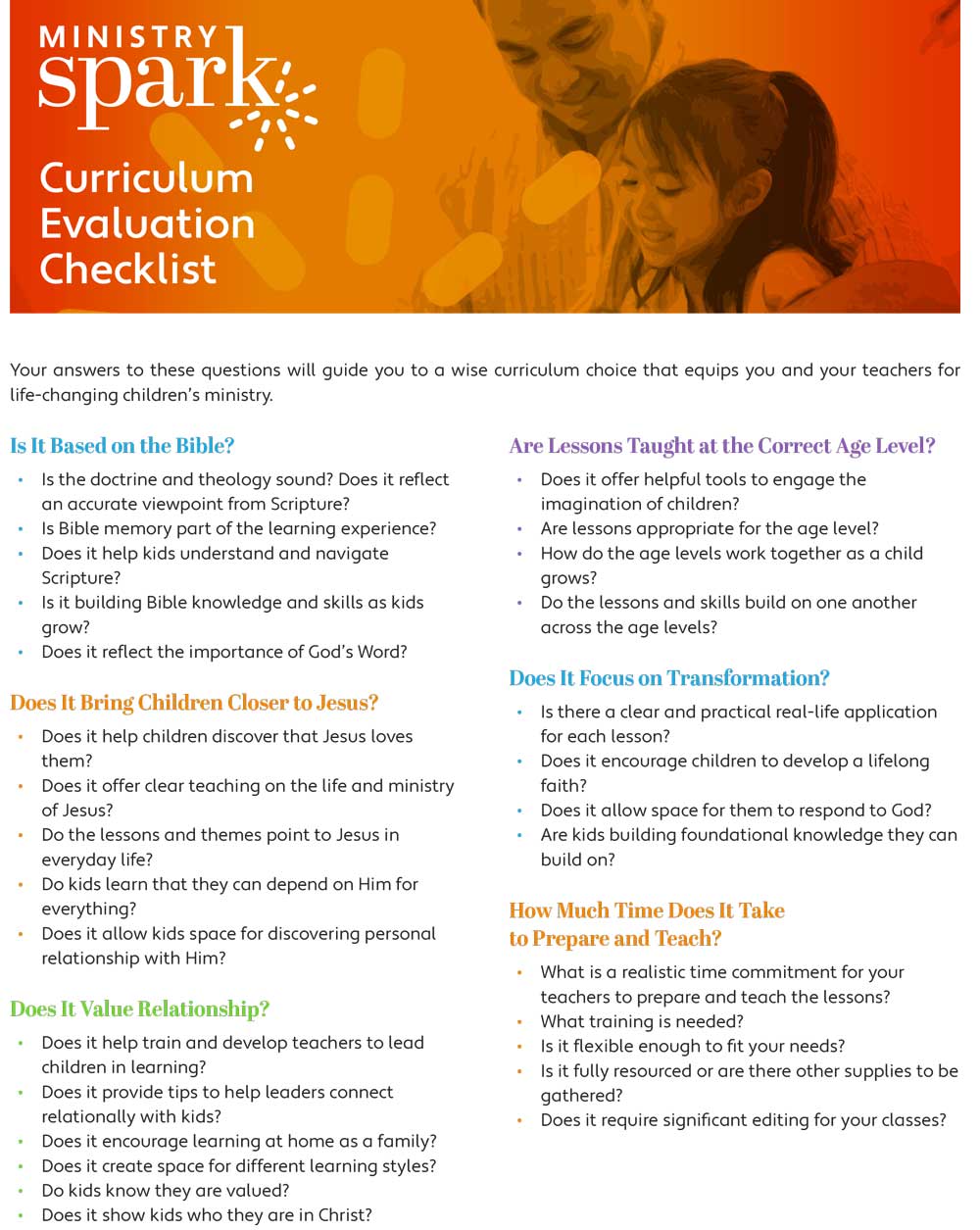One of the most important things we can do as children’s ministry leaders is instill faith in the kids that we serve. We can’t just fall into that though. It takes dependence on God, focus, planning, and strategy.
If we don’t make a plan for helping kids find faith in Jesus, we are really doing these children a disservice.

Jesus works in the supernatural and, yes, He is able to reach these children even if we fail. Because He can! But we should look to support kids in finding Him the very best we know how.
In addition, we should look at the big picture of our ministries and think to ourselves: “If a child begins as a toddler at our church and stays through 6th grade, what will he or she have learned and experienced?”
We understand there are children who will come and go. And we understand the lack of consistency in attendance. But we should be thinking long-term for these kids.
Will what we’ve done be a complete picture to them? Or will it feel like a bunch of choppy pieces that they can’t figure out how to put together? We hope it’s the former. But we have to be intentional about the picture we are painting.
That’s why evaluating curriculum is so important. It’s also why helping our teachers understand the choice of curriculum is important.
Your answers to these questions will guide you to a wise curriculum choice that equips you and your teachers for life-changing children’s ministry.
Your whole team should be in tune with the whole vision of your ministry.
Evaluating Curriculum
As you consider choosing curriculum for your children’s program, these are some questions that can guide you and provide a great framework for your team to discuss.

#1: Is It Based on the Bible?
The Bible is the foundation on which a solid curriculum is built. Especially with the decline in biblical literacy, it’s more important than ever to impart truths from God’s Word to the next generation.
- Are the doctrine and theology sound? Do they reflect an accurate viewpoint from Scripture?
- Is Bible memory part of the learning experience?
- Does it help kids understand and navigate Scripture?
- Is it building Bible knowledge and skills as kids grow?
- Does it reflect the importance of God’s Word?
Maybe this sounds silly to you—what curriculum doesn’t focus on Scripture? Be careful and use wisdom when looking at curriculum. Because God’s Word is important in leading kids to Jesus.
#2: Does It Bring Children Closer to Jesus?
Life-changing ministry begins with a commitment to one thing—leading people to Jesus. Jesus said, “I am the way and the truth and the life” (John 14:6 NIV).
When we teach Him, we teach everything. We will never be satisfied until we see young hearts and lives committed not only to His teachings but to Him.
- Does it help children discover Jesus’ love for them?
- Does it offer clear teaching on the life and ministry of Jesus?
- Do the lessons and themes point to Jesus in everyday life?
- Do kids learn that they can depend on Him for everything?
- Does it allow kids space to discover personal relationship with Him?
There will be kids in your classrooms from various backgrounds. It’s important to give a full picture of Jesus so they understand who He is and know how they can depend on Him.
#3: Does It Value Relationship?
Spiritual growth happens best within the context of close personal relationships. When trust is established, children can go deeper—they feel safe sharing their thoughts and responses about God and what they are learning.
- Does it help train and develop teachers to lead children in learning?
- Does it provide tips to help leaders connect relationally with kids?
- Do kids know they are valued?
- Does it encourage learning at home as a family?
- Does it create space for different learning styles?
- Will it show kids who they are in Christ?
These questions are important. It’s so important that we create environments where kids know they are safe to ask questions and explore their faith.
We desire for kids to have a real-life faith. And sometimes, that’s asking those tough questions.
#4: Are Lessons Taught at the Correct Age Level?
Successful ministries teach children the Bible in ways that are relevant to each age and stage of life. Lessons that are written for the correct age level are easier to teach and are better understood by children.
- Does it offer helpful tools to engage the imaginations of children?
- Are lessons appropriate for the age level?
- How do the age levels work together as a child grows?
- Do the lessons and skills build on one another across the age levels?
It’s important to know the span of your curriculum, and not only how it impacts kids over a year, but how it impacts them through the life of your ministry!
#5: Does It Focus on Transformation?
This is the most important question because the goal of ministry is changed lives. Certainly, it is as much about the here and now as it is about the future and eternity.

- Is there a clear and practical real-life application for each lesson?
- Does it encourage children to develop a lifelong faith?
- Does it allow space for them to respond to God?
- Are kids building foundational knowledge they can build on?
Giving children space to respond to God’s Word is so important in developing their relationship with Him.
#6: How Much Time Does It Take to Prepare and Teach?
This question is important to your volunteers. Especially those who have full-time jobs, family commitments, and other things going on! So make sure your curriculum is volunteer friendly.
- What is a realistic time commitment for your teachers to prepare and teach the lessons?
- What training is needed?
- Is it flexible enough to fit your needs?
- Is it fully resourced or are there other supplies to be gathered?
- Does it require significant editing for your classes?
These questions will get you started in evaluating different curriculum lines to find the best fit for your church.
There are several others you will need to ask, such as:
- Does the format fit the needs of your church?
- Are the lessons interactive? In what ways?
- Are there videos or music?
- Are the lessons available digitally or in print?
- Is the curriculum inclusive for children of all abilities?
- Does the cost fit your ministry budget?
Your answers to these questions will guide you to a wise choice—to a curriculum that will equip you and your teachers for life-changing children’s ministry.
“He who began a good work in you will bring it to completion” (Phil. 1:6 NIV).

Curriculum Evaluation Checklist

Curriculum Evaluation Checklist








